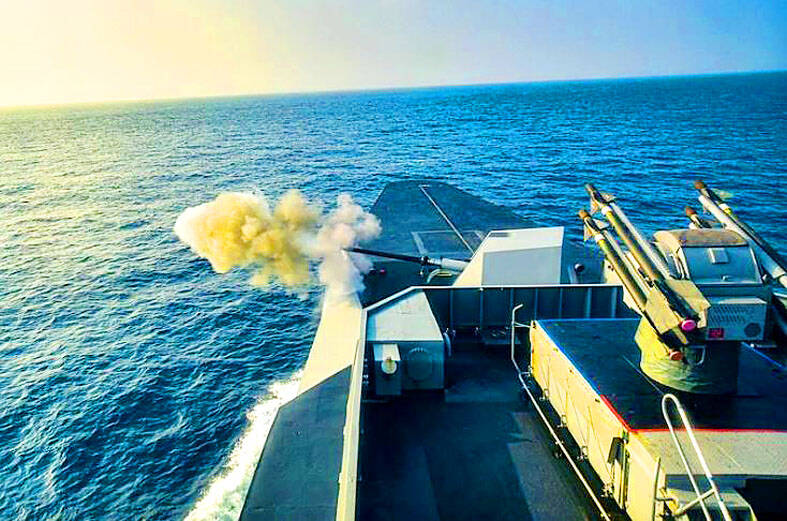The navy is retrofitting its fleet with domestically developed Huayang air defense missile vertical launch systems, after the launchers recently passed certification tests, a defense official said on condition of anonymity on Wednesday.
The amphibious assault ship Kaohsiung — which the Chungshan Institute of Science and Technology is using as a test platform for the launchers — has fired Hai Chien II (Sea Sword) and Hai Kung III (Sea Bow) missiles with the system, he said.
The Kaohsiung had previously been a command ship in the navy, the official said, adding that an add-on seen on the vessel was likely a prototype active phased array radar unit.

Photo courtesy of the Republic of China Navy
The navy plans to equip Kang Ding-class frigates, the proposed next-generation guided missile frigates, the landing platform dock Yushan and potentially other warships, he said.
The launch system and Hai Chien II missiles have already been installed in the frigate Si Ning as part of the Kang Ding-class combat systems upgrade program, he said.
Retrofitting the ship class with vertical launch systems — which have a superior firing rate over older launch systems — would bolster the navy’s anti-air capabilities, the official said.
The retrofit would enhance the fleet’s air-defense capabilities, as vertical launch systems enable a higher firing rate than is possible with older missile launch systems, he said.
Box-type launchers are currently used on Kang Ding and Chi Yang-class frigates, Tuo Chiang-class corvettes and the Yushan, while single-arm launchers are used on Cheng Kung-class frigates and double-armed launchers are used on Keelung-class frigates, he said.
Separately, the official said that the navy’s Cheng Kung-class frigates — formerly US Knox-class ships — are to receive the SM-2 dual-purpose anti-air and anti-ship missiles as a replacement for the older SM-1s.
The military is considering a comprehensive upgrade to the aging warships, he added.

‘DENIAL DEFENSE’: The US would increase its military presence with uncrewed ships, and submarines, while boosting defense in the Indo-Pacific, a Pete Hegseth memo said The US is reorienting its military strategy to focus primarily on deterring a potential Chinese invasion of Taiwan, a memo signed by US Secretary of Defense Pete Hegseth showed. The memo also called on Taiwan to increase its defense spending. The document, known as the “Interim National Defense Strategic Guidance,” was distributed this month and detailed the national defense plans of US President Donald Trump’s administration, an article in the Washington Post said on Saturday. It outlines how the US can prepare for a potential war with China and defend itself from threats in the “near abroad,” including Greenland and the Panama

A wild live dugong was found in Taiwan for the first time in 88 years, after it was accidentally caught by a fisher’s net on Tuesday in Yilan County’s Fenniaolin (粉鳥林). This is the first sighting of the species in Taiwan since 1937, having already been considered “extinct” in the country and considered as “vulnerable” by the International Union for Conservation of Nature. A fisher surnamed Chen (陳) went to Fenniaolin to collect the fish in his netting, but instead caught a 3m long, 500kg dugong. The fisher released the animal back into the wild, not realizing it was an endangered species at

The High Prosecutors’ Office yesterday withdrew an appeal against the acquittal of a former bank manager 22 years after his death, marking Taiwan’s first instance of prosecutors rendering posthumous justice to a wrongfully convicted defendant. Chu Ching-en (諸慶恩) — formerly a manager at the Taipei branch of BNP Paribas — was in 1999 accused by Weng Mao-chung (翁茂鍾), then-president of Chia Her Industrial Co, of forging a request for a fixed deposit of US$10 million by I-Hwa Industrial Co, a subsidiary of Chia Her, which was used as collateral. Chu was ruled not guilty in the first trial, but was found guilty

DEADLOCK: As the commission is unable to forum a quorum to review license renewal applications, the channel operators are not at fault and can air past their license date The National Communications Commission (NCC) yesterday said that the Public Television Service (PTS) and 36 other television and radio broadcasters could continue airing, despite the commission’s inability to meet a quorum to review their license renewal applications. The licenses of PTS and the other channels are set to expire between this month and June. The National Communications Commission Organization Act (國家通訊傳播委員會組織法) stipulates that the commission must meet the mandated quorum of four to hold a valid meeting. The seven-member commission currently has only three commissioners. “We have informed the channel operators of the progress we have made in reviewing their license renewal applications, and